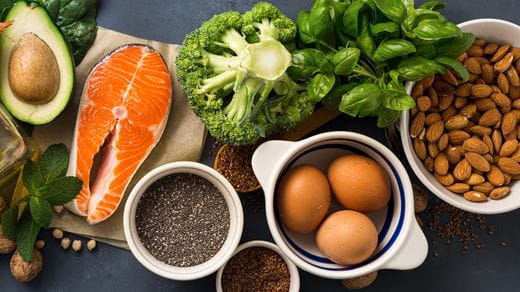Good for you and the planet: plant-based diets for a more sustainable future
A healthy diet, such as that recommended by Canada’s Food Guide, involves eating more plant-based foods and fewer that come from animals.1 Plant-forward or plant-based eating patterns are beneficial to health and may have a lower environmental impact.1
The World Health Organization, the EAT-Lancet Commission and several countries, including Canada, have aligned health and environmental sustainability into dietary guidelines.1-4
As health professionals, we can take the lead in helping people make sustainable and nutritious food choices.2,5
Let your clients know that embracing plant-based eating can still mean including small amounts of animal-based foods, such as lean meats, dairy products and eggs.1
Dietary guidelines from Canada, Europe, the U.S.A., the EAT-Lancet Commission and the World Health Organization all support a well-balanced healthy plant-based diet that includes recommended essential fats, the right amount of energy (calories), optimal protein quality and quantity, vitamins, minerals and dietary fibre, low in saturated fats and sodium.1,2,4,6-8
Generally speaking, a healthy plant-based diet is:
- High in vegetables, fruits, whole grains, low-or non-fat dairy, fish, seafood, legumes, seeds and nuts.1
- Low in red and processed meat and low in sugar-sweetened foods and drinks, refined grains and salt.1
Plant-based eating’s role in sustainability
Food production requires resources – namely land, energy and water.1 The production of food contributes to climate change and accounts for 20 to 30% of the world’s greenhouse gas (GHG) emissions.2 If nothing changes and food systems cannot reduce this negative environmental impact, the capacity to provide healthy diets for all in the future will be compromised. One way to improve sustainability is to move towards plant-based eating while reducing consumption of animal foods such as meat and dairy.2,9
Plant-based diets are a great choice for clients who want to stay healthy and adopt a more sustainable lifestyle. Plant-based foods rely much less on energy, land and water than animal-based foods, and therefore generally have lower GHG emissions.1,2 In fact, the carbon footprint of a diet containing high levels of meat and dairy is twice the size of the footprint of a vegan diet.10
By eating a plant-based diet we can reduce our individual environmental impact.2,11,12
Understanding the Environmental Impacts of Plant-Based Products
Choosing to replace butter with a plant-based margarine or spread is a small step individuals can take to both reduce the amount of saturated fat in their diet and help create a more sustainable future.13
Plant-based margarines and spreads have significantly less environmental impact in comparison to dairy butter. In a study conducted by Flora Food Group in partnership with Quantis focused on Life Cycle Assessments (LCAs), they found that plant-based margarines and spreads have on average a 70% lower climate impact, occupy two-thirds less land and use less than half the water when compared with the same amount of dairy butter.13,15 Compared with 1kg of dairy butter, the same amount of plant-based margarines and spreads are responsible for 9kg less carbon dioxide equivalents or greenhouse gases, occupy 8m2 less land per year, and use 100 litres less water.
Simply put, plant-based margarines or spreads are a simple and more sustainable way to add essential fatty acids and fat-soluble vitamins to your clients’ diets.2
References
- Health Canada. Canada’s dietary guidelines for health professionals and policy makers. 2019. https://food-guide.canada.ca/en/healthy-eating-resources/ Sourced Mar 9, 2020.
- World Health Organization (WHO). A healthy diet sustainably produced - information sheet. 2018. https://www.who.int/nutrition/publications/nutrientrequirements/healhtydiet-information-sheet/en/ Sourced Mar 9, 2020.
- Gonzalez FC, et al. Plates, pyramids, planet. Developments in national healthy and sustainable dietary guidelines: a state of play assessment. 2016. http://www.fao.org/documents/card/en/c/d8dfeaf1-f859-4191-954f-e8e1388cd0b7/ Sourced Mar 9, 2020.
- The EAT-Lancet Commission. Healthy diets from sustainable food systems. 2019. https://eatforum.org/content/uploads/2019/07/EAT-Lancet_Commission_Summary_Report.pdf Sourced May 15, 2020.
- Dietitians of Canada. Sustainable food systems: dietitians' roles. 2020. https://www.dietitians.ca/DietitiansOfCanada/media/Documents/Resources/Sustainable-Food-Systems-Dietitians-Roles-(Role-Paper).pdf?ext=.pdf Sourced May 15, 2020.
- Health Council of the Netherlands. Dutch dietary guidelines. 2015. https://www.healthcouncil.nl/documents/advisory-reports/2015/11/04/dutch-dietary-guidelines-2015 Sourced Mar 9, 2020.
- Nordic Council of Ministers. Nordic nutrition recommendations. 2012. https://norden.diva-portal.org/smash/get/diva2:704251/FULLTEXT01.pdf Sourced Mar 9, 2020.
- US Department of Agriculture. Dietary guidelines for Americans 2015-2020. Eighth edition. https://health.gov/dietaryguidelines/2015/guidelines/ Sourced Mar 9, 2020.
- Nelson M, et al. Alignment of healthy dietary patterns and environmental sustainability: A systematic review. Advances in Nutrition 2016;7(6):1005–25. https://www.ncbi.nlm.nih.gov/pubmed/28140320 Sourced Mar 9, 2020.
- Scarborough P, et al. Dietary greenhouse gas emissions of meat-eaters, fish-eaters, vegetarians and vegans in the UK. Climatic Change 2014;125(2): 179-192. https://link.springer.com/article/10.1007/s10584-014-1169-1 Sourced Mar 9, 2020.
- Wynes S, et al. The climate mitigation gap: education and government recommendations miss the most effective individual actions. Environ Res Lett 2017. https://iopscience.iop.org/article/10.1088/1748-9326/aa7541 Sourced Mar 9, 2020.
- Poore J, et al. Reducing food’s environmental impacts through producers and consumers. Science 2018;360:987-992. https://www.ncbi.nlm.nih.gov/pubmed/29853680 Sourced Mar 9, 2020.
- Flora Food Group. Putting our words into environmental action. 2021. https://upfield.com/purpose/better-planet/climate-action/. Sourced December 20, 2021.
- Milà I, et al. Land use impact assessment of margarine. Int J Life Cycle Assess 2016;18(6):1265–1277. https://doi.org/10.1007/s11367-012-0380-4 Sourced Mar 9, 2020.
- Life Cycle Assessment (LCA) conducted by Quantis consulting, published in the International Journal of Lifecycle Assessment (https://link.springer.com/article/10.1007/s11367-019-01703-w), assessing Flora Food Group’s plant butters and spreads compared on a weighted average basis to dairy butter across North America and Europe. See https://www.upfield.com/-/media/Project/Upfield/Corporate/Upfield-Corporate/Supplier-Centre/ESG-centre-PDFs/reporting-methodologies/https://www.upfield.com/-/media/Project/Upfield/Corporate/Upfield-Corporate/Supplier-Centre/ESG-centre-PDFs/reporting-methodologies/Upfield_CarbonLabelStatement_TechnicalSummary_2021_10_05_Quantis.pdf?rev=7b08a382febd4911b571dec93940e6eb.pdf?rev=7b08a382febd4911b571dec93940e6eb and https://www.upfield.com/our-purpose/better-planet/climate-action for further information.




